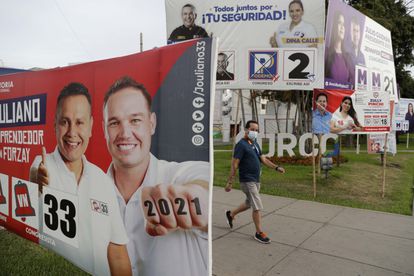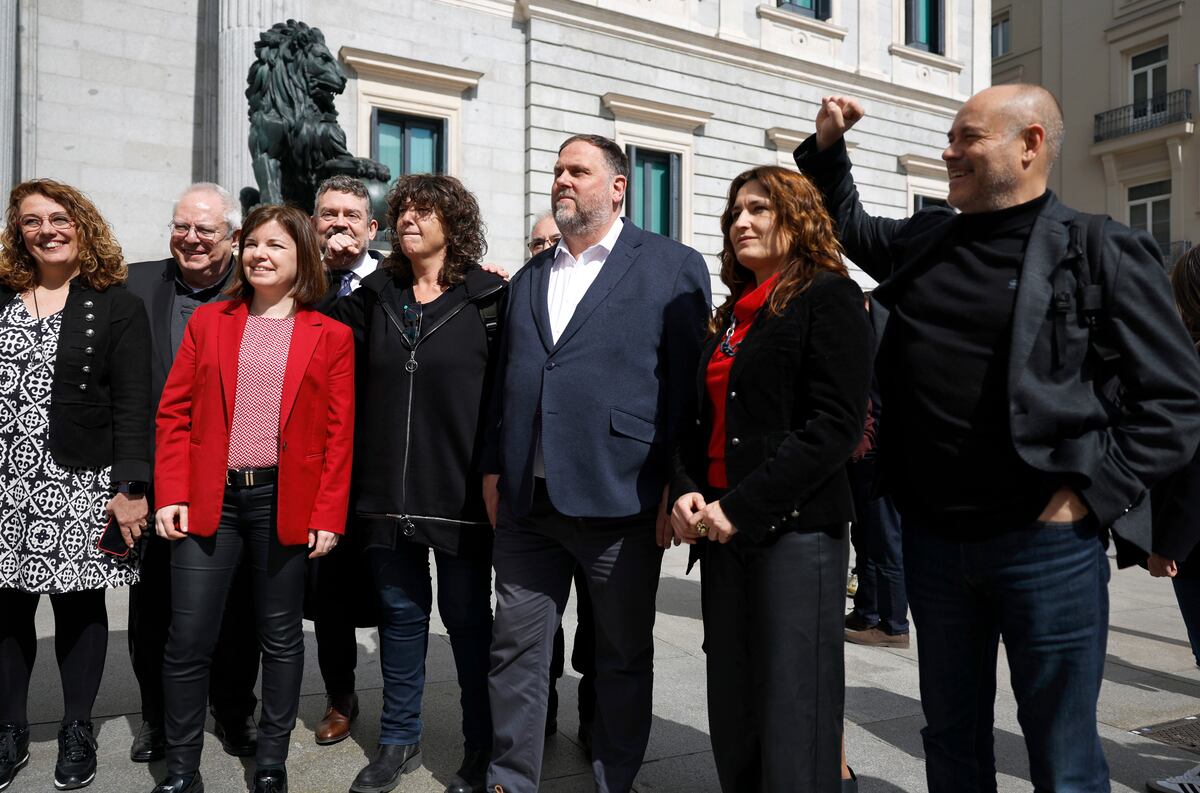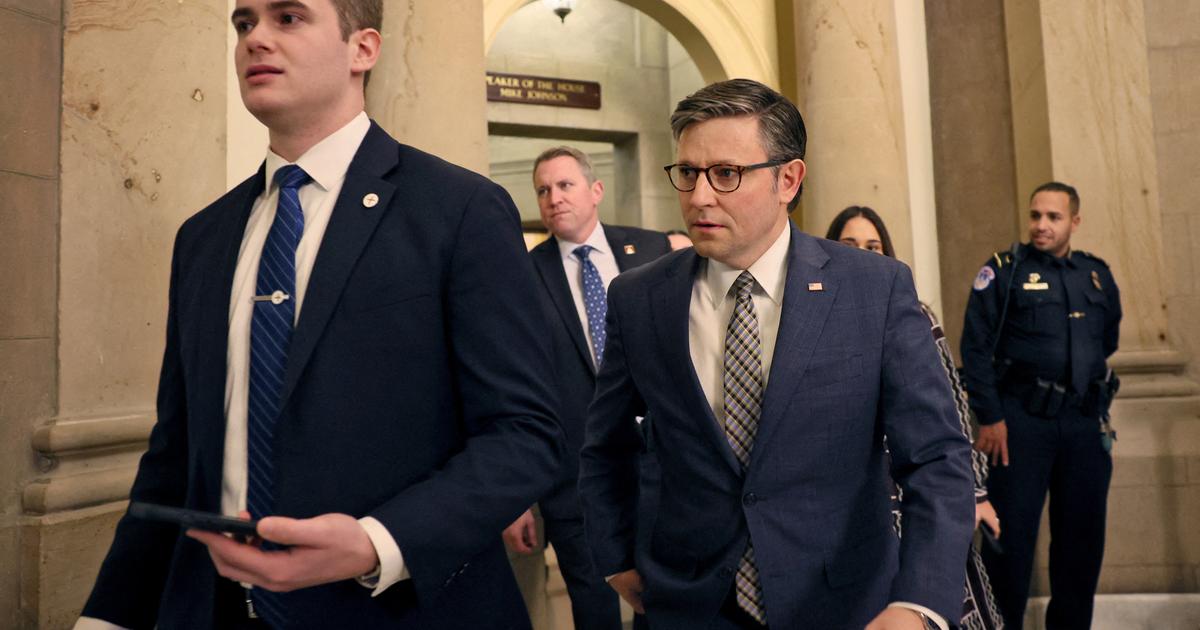CHRONICLE ACCOMPANY: PERU ELECTIONS - AME3388.
LIMA (PERU), 03/17/2021.- Photograph of various electoral posters on March 15, 2021, in Lima (Peru).
If in Peru one says to another "terruco" or "caviar" it is probable that this one will throw in face to be an "aprofujimontesinista" and, if he is already a certain age, perhaps also "old lesbian", all a very particular political jargon that shines in the heat of social networks before the imminent elections.
EFE / Paolo AguilarPaolo Aguilar / EFE
Former congressman Yonhy Lescano heads the electoral polls in Peru with two weeks to go before the general elections, but a very short distance from the others.
Lescano, backed by 11.4% of Peruvians, is on the heels of another five candidates with support ranging between 10% and 8%, according to a telephone survey released by the Institute of Peruvian Studies (IEP) this Sunday.
"There are two groups where the candidates seem interchangeable," says the sociologist Patricia Zárate, head of opinion studies of that organization, when referring to the blocks in confrontation: in the center left and left Yonhy Lescano, Verónika Mendoza and Pedro Castillo.
In the other, the conservatives Rafael López, George Forsyth, Keiko Fujimori and Hernando de Soto.
The final result is in the hands of the 27% of undecided who have not yet defined their vote.
The IEP survey released in mid-March registered an upward trend in preferences for Lescano and López, but in this week's poll Lescano, Popular Action candidate, obtained 11.4%, that is, 2.5 points less than 15 days ago.
In turn, the survey shows the stagnation in voting intention towards López, with 9.7%.
The far-right candidate and member of Opus Dei leads Renovación Popular, the new name of the political formation Solidaridad Nacional, of Luis Castañeda, former mayor of Lima investigated for corruption.
The Popular Renewal candidate for the first vice presidency is a member of the Sodalicio de Vida Cristiana, a Peruvian Catholic sect sanctioned by the Vatican for psychological and sexual abuse.
“In the
focus groups
we have held, ordinary people don't think about that.
Those who say they vote for López do not pay attention to whether he represents the extreme right, they see that he is a businessman and that he speaks directly.
Some of them voted for Ollanta Humala before, ”explains Zárate.
According to the poll released on Sunday, the two candidates with the highest increase in voting intentions are the moderate leftist Verónika Mendoza of the political group Juntos por el Perú, and the conservative economist Hernando de Soto, former adviser to former President Alberto Fujimori and the presidential candidate Keiko Fujimori, who is running for the third time in the elections.
9.6% of respondents prefer Mendoza and 8.5% De Soto, who is running for Avanza País.
Mendoza, winner of the debate
On Sunday 21, after a televised debate over the open signal, the América TV channel broadcast the results of an internet poll on the winner: 34% preferred Mendoza, the left-wing candidate who ran for the presidency for the first time in 2016 The former congresswoman for Cusco proposes that internet access is a right and offers a referendum for a new Constitution.
"Mendoza rose in voting intention after the debate, but De Soto also rose and was not in the debate," adds the sociologist from the Institute of Peruvian Studies.
Could the increase of 2.8 points in the last two weeks towards the Avanza País candidate be due to his campaign on social media, such as Tik Tok?
Zárate doubts that this is the reason and also notes that De Soto's moral sanction for having been vaccinated in the United States has not been recorded in the poll.
The candidate said in February that although he was offered a vaccination, he turned it down because he did not like the privileges.
However, on Wednesday, pressed by questions from the press, he acknowledged that he was immunized thanks to "some friends" in Houston.
“We are not yet a society used to social media campaigns.
Despite the restrictions due to the pandemic and that not many people can receive the candidates when they travel (in proselytizing activities), the physical presence of the candidates transmits first-hand the feeling that we are in elections ”, comments the sociologist.
"There is 27% of voters who have not decided yet, and no candidate captures the undecided, perhaps because the proposals are intermingled: they all want a change and they all go with offers of change," says Zárate.
The presidential candidate of the right-wing Popular Force, Keiko Fujimori, has a 7.9% intention to vote, and has needed permission from a judge for each campaign trip outside of Lima.
The Prosecutor's Office has accused the autocrat's eldest daughter of money laundering, organized crime and other crimes related to the irregular financing of his electoral campaigns in 2011 and 2016. In addition, the radical leftist Pedro Castillo, a school teacher and leader of his union , has 4.3% of the preferences.
Given that there are 18 candidates for the presidency for the elections, the National Elections Jury has foreseen that the official debate will take place on three dates: between this Monday and Wednesday.
The atomization of electoral preferences could take on clearer trends after those days, before the week of silence for the campaigns and pollsters begins.


/cloudfront-eu-central-1.images.arcpublishing.com/prisa/RHYRDMQQ7BG5JOUSKAXBLKE6YE.jpg)




/cloudfront-eu-central-1.images.arcpublishing.com/prisa/NMIZTPV72FHZ54PNDM3NR5QGAI.jpg)

